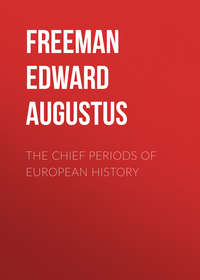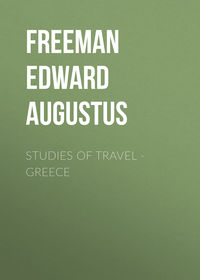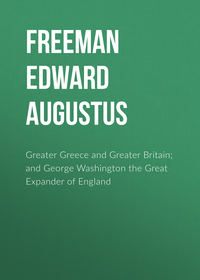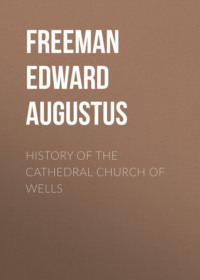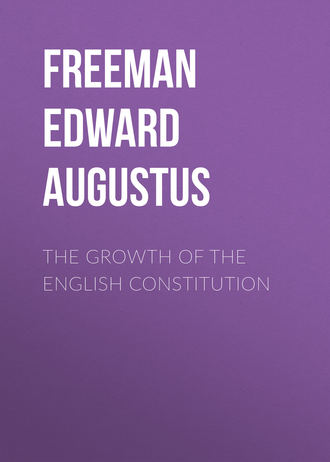 полная версия
полная версияThe Growth of the English Constitution
17
I wish to leave the details of Eastern matters to Eastern scholars. But there are several places in the Old Testament where we see something very much like a general assembly, combined with distinctions of rank among its members, and with the supremacy of a single chief over all.
18
Iliad, xx. 4.
Ζεὺς δὲ Θέμιστα κέλευσε θεοὺς ἀγορήνδε καλέσσαι
Κρατὸς ἄπ' Οὐλύμπω πολυπτύχου· ἡ δ’ ἄρα πάντη
Φοιτήσασα κέλευσε Διὸς πρὸς δῶμα νέεσθαι.
Οὔτε τις οὖν Ποταμῶν ἀπέην, νόσφ' Ὠκεανοῖο,
Οὔτ' ἄρα Νυμφάων ταί τ' ἄλσεα καλὰ νέμονται,
Καὶ πηγὰς ποταμῶν, καὶ πίσεα ποιήεντα.
Besides the presence of the Nymphs in the divine Mycel Gemót, something might also be said about the important position of Hêrê, Athênê, and other female members of the inner council.
We find the mortal Assembly described at length in the second book of the Iliad, and indeed by implication at the very beginning of the first book.
19
We hear the applause of the assembly in i. 23 and ii. 333, and in the Trojan Assembly, xviii. 313.
20
On the whole nature of the Homeric ἀγορή see Gladstone’s Homer and the Homeric Age, iii. 14. Mr. Gladstone has to my thinking understood the spirit of the old Greek polity much better than Mr. Grote.
21
There is no need to go into any speculations as to the early Roman Constitution, as to the origin of the distinction of patres and plebs, or any of the other points about which controversies have raged among scholars. The three elements stand out in every version, legendary and historical. In Livy, i. 8, Romulus first holds his general Assembly and then chooses his Senate. And in c. 26 we get the distinct appeal from the King, or rather from the magistrates acting by his authority, to an Assembly which, whatever might be its constitution, is more popular than the Senate.
22
It is hardly needful to show how the Roman Consuls simply stepped into the place of the Kings. It is possible, as some have thought, that the revolution threw more power into patrician hands than before, but at all events the Senate and the Assembly go on just as before.
23
Tacitus, de Moribus Germaniæ, c. 7-13:
“Reges ex nobilitate; Duces ex virtute sumunt. Nec Regibus infinita aut libera potestas; et Duces exemplo potius quam imperio: si prompti, si conspicui, si ante aciem agant, admiratione præsunt… De minoribus rebus Principes consultant; de majoribus omnes; ita tamen ut ea quoque quorum penes plebem arbitrium est apud Principes pertractentur… Ut turbæ placuit, considunt armati. Silentium per Sacerdotes, quibus tum et coercendi jus est, imperatur. Mox Rex, vel Princeps, prout ætas cuique, prout nobilitas, prout decus bellorum, prout facundia est audiuntur, auctoritate suadendi magis quam jubendi potestate. Si displicuit sententia, fremitu adspernantur; sin placuit, frameas concutiunt. Honoratissimum adsensûs genus est, armis laudare. Licet apud concilium adcusare quoque et discrimen capitis intendere… Eliguntur in iisdem conciliis et Principes, qui jura per pagos vicosque reddant. Centeni singulis ex plebe comites, consilium simul et auctoritas, adsunt. Nihil autem neque publicæ neque privatæ rei nisi armati agunt.”
For a commentary, see Zöpfl, Geschichte der deutschen Rechtsinstitute, p. 94. See also Allen, Royal Prerogative, 12, 162.
24
See Norman Conquest, i. 95. The primitive Constitution lasted longest at the other end of the Empire, in Friesland. See Eichhorn, Deutsche Staats-und Rechtsgeschichte, ii. 265, iii. 158. Zöpfl, Geschichte der deutschen Rechtsquellen, p. 154.
25
Τὰ ἀρχαῖα ἤθη κρατείτω is an ecclesiastical maxim; rightly understood, it is just as true in politics.
26
See my papers on “the Origin of the English Nation” and “the Alleged Permanence of Roman Civilization in England” in Macmillan’s Magazine, 1870.
27
See Schmid, Gesetze der Angel-Sachsen, on the words “wealh” and “wylne.” Earle, Philology of the English Tongue, 318. On the fact that the English settlers brought their women with them, see Historical Essays, p. 36.
28
On Eorlas and Ceorlas I have said something in the History of the Norman Conquest, i. 80. See the two words in Schmid, and the references there given.
29
On the Barons of Attinghausen, see Blumer, Staats- und Rechtsgeschichte der schweizerischen Demokratien, i. 122, 214, 272.
30
I cannot at this moment lay my hand on my authority for this curious, and probably mythical, custom, but it is equally good as an illustration any way.
31
This custom is described by Diodôros, i. 70. The priest first recounted the good deeds of the King and attributed to him all possible virtues; then he invoked a curse for whatever has been done wrongfully, absolving the King from all blame and praying that the vengeance might fall on his ministers who had suggested evil things (τὸ τελευταῖον ὑπὲρ τῶν ἀγνοουμένων ἀρὰν ἐποιεῖτο, τὸν μὲν βασιλέα τῶν ἐγκλημάτων ἐξαιρούμενος, εἰς δὲ τοὺς ὑπηρετοῦντας καὶ διδάξαντας τὰ φαῦλα καὶ τὴν βλαβὴν καὶ τὴν τιμωρίαν ἀξιῶν ἀποσκῆψαι). He wound up with some moral and religious advice.
32
Tacitus (Germ. 25) distinguishes “eæ gentes quæ regnantur” from others. And in 43 he speaks of “erga Reges obsequium” as characteristic of some particular tribes: see Norman Conquest, i. 579.
33
On the use of the words Ealdorman and Heretoga, see Norman Conquest, i. 581, and the references there given.
34
See Norman Conquest, i. 583, and the passages in Kemble and Allen there referred to.
35
See Kemble’s Saxons in England, i. 152, and Massmann’s Ulfilas, 744.
36
See the words driht, drihten in Bosworth’s Anglo-Saxon Dictionary.
37
To say nothing of other objections to this derivation, its author must have fancied that ing and not end was the ending of the Old-English participle. The mistake is as old as Sir Thomas Smith. See his Commonwealth of England, p. 12.
38
See Norman Conquest, i. 583, and the passages there quoted. I am afraid of meddling with Sanscrit, but it strikes me that the views of Allen and Kemble are not inconsistent with a connexion with the Sanscrit Ganaka. As one of the curiosities of etymology, it is worth noticing that Mr. Wedgwood makes the word “probably identical with Tartar chan.”
39
We read in the Chronicles, 449, how, on the first Jutish landing in Kent, “heora heretogan wæron twegen gebroðra Hengest and Horsa.” It is only in 455, on the death of Horsa, that “æfter Þam Hengest feng to rice and Æsc his sunu”; and in 488, seemingly on the death of Hengest, “Æsc feng to rice and was xxiiii wintra Cantwara cyning.” So among the West-Saxons, in 495, “coman twegen ealdormen on Brytene, Cerdic and Cynric his sunu.” It is only in 519 that we read “her Cerdic and Cynric West-Sexena rice onfengun.”
40
The distinction between Kings and Jarls comes out very strongly in the account of the battle of Ashdown (Æscesdune) in the Chronicles in 871. The Danes “wæron on twam gefylcum, on oþrum wæs Bagsecg and Healfdene, þa hæðenan cingas and on oðrum wæron þa eorlas.” It may be marked that in the English army King Æthelred is set against the Danish Kings, and his brother the Ætheling Ælfred against the Jarls. So in the Song of Brunanburh we read of the five Kings and seven Jarls who were slain.

We may mark that the Kings were young, as if they had been chosen “ex nobilitate;” nothing is said of the age of the Jarls, who were doubtless chosen “ex virtute.”
41
I have quoted the passage from Bæda about the satraps in Norman Conquest, i. 579. The passage in the Life of Saint Lebuin, quoted in note 15, also speaks of “principes” as presiding over the several pagi or gauen, but he speaks of no King or other common chief over the whole country. And this is the more to be marked, as there was a “generale concilium” of the whole Old-Saxon nation, formed, as we are told, of twelve chosen men from each gau. This looks like an early instance of representation, but it should be remembered that we are here dealing with a constitution strictly Federal.
In the like sort we find the rulers of the West-Goths at the time of their crossing the Danube spoken of as Judices. See Ammianus, xxvii. 5, and the notes of Lindenbrog and Valesius. So also Gibbon, c. xxv. (iv. 305, ed. Milman). So Jornandes(26) speaks of “primates eorum, et duces, qui regum vice illis præerant.” Presently he calls Fredigern “Gothorum regulus,” like the subreguli or under-cyningas of our own History. Presently in c. 28 Athanaric, the successor of Fredigern, is pointedly called Rex.
On all this, see Allen, Royal Prerogative, 163.
42
See Norman Conquest, i. 75, 580.
43
The best instance in English History of the process by which a kingdom changed into a province, by going through the intermediate stage of a half-independent Ealdormanship, is to be found in the history of South-Western Mercia under its Ealdorman Æthelred and the Lady Æthelflæd, in the reigns of Ælfred and Eadward the Elder. See Norman Conquest, i. 563.
44
See Norman Conquest, i. 39, 78.
45
Iliad, ix. 160: —
καὶ μοὶ ὑποστήτω, ὅσσον βασιλεύτερός εἰμι.
46
The instances in which a great kingdom has been broken up into a number of small states practically independent, but owning a nominal superiority in the successor of the original Sovereign, are not few. In the case of the Empire I have found something to say about it in my Historical Essays, 151, and in the case of the Caliphate in my History and Conquest of the Saracens, 137. How the same process took place with the Mogul Empire in India is set forth by Lord Macaulay in his Essays on Lord Clive and Warren Hastings. But he should not have compared the great Mogul, with his nominal sovereignty, to “the most helpless driveller among the later Carlovingians,” a class whom Sir Francis Palgrave has rescued from undeserved contempt. But the breaking up of the Western Kingdom is none the less an example of the same law. The most remarkable thing is the way, or rather the three different ways, in which the scattered members have been brought together again in Germany, Italy, and France.
This process of dismemberment, where a nominal supremacy is still kept by the original Sovereign, must be distinguished from that of falling back upon Dukes or Ealdormen after a period of kingly rule. In this latter case it would seem that no central sovereignty went on.
47
At this time of day I suppose it is hardly necessary to prove the elective character of Old-English kingship. I have said what I have to say about it in Norman Conquest, i. 106, 596. But I may quote one most remarkable passage from the report made in 787 to Pope Hadrian the First by George and Theophylact, his Legates in England (Haddan and Stubbs, Councils and Ecclesiastical Documents, iii. 453). “Sanximus ut in ordinatione Regum nullus permittat pravorum prævalere assensum: sed legitime Reges a sacerdotibus et senioribus populi eligantur.” One would like to know who the “pravi” here denounced were. The passage sounds very like a narrowing of the franchise or some other interference with freedom of election, but in any case it bears witness to the elective character of our ancient kingship, and to the general popular character of the constitution.
48
I have described the powers of the Witan, as I understand them and as they were understood by Mr. Kemble, at vol. i. p. 108 of the History of the Norman Conquest and in some of the Appendices to that volume. With regard to the powers of the Witan, I find no difference between my own views and those of Professor Stubbs in the Introductory Sketch to his Select Charters (p. 11), where the relations between the King and the Witan, and the general character of our ancient constitution, are set forth with wonderful power and clearness. But I find Mr. Stubbs and myself differing altogether as to the constitution of the Witenagemót. I look upon it as an Assembly of the whole kingdom, after the type of the smaller assemblies of the shire and other lesser divisions. Mr. Stubbs fully admits the popular character of the smaller assemblies, but denies any such character to the national gathering. It is dangerous to set oneself up against the greatest master of English constitutional history, but I must ask the reader to weigh what I say in note Q in the Appendix to my first volume.
49
I have collected some of the instances of deposition in Northumberland in the note following that on the constitution of the Witenagemót. (Norman Conquest, i. 593.) It is not at all unlikely that the report of George and Theophylact quoted above may have a special reference to the frequent changes among the Northumbrian Kings.
50
I have mentioned all the instances at vol. i. p. 105 of the Norman Conquest: Sigeberht, Æthelred, Harthacnut, Edward the Second, Richard the Second, James the Second. It is remarkable that nearly all are the second of their respective names; for, besides Æthelred, Edward, Richard, and James, Harthacnut might fairly be called Cnut the Second.
51
Tacitus, De Moribus Germaniæ, 13, 14: – “Nec rubor inter comites adspici. Gradus quinetiam et ipse comitatus habet, judicio ejus quem sectantur; magnaque et comitum æmulatio quibus primus apud Principem suum locus; et Principum cui plurimi et acerrimi comites… Quum ventum in aciem, turpe Principi virtute vinci, turpe comitatui virtutem Principis non adæquare. Jam vero infame in omnem vitam ac probrosum, superstitem Principi suo ex acie recessisse. Illum defendere, tueri, sua quoque fortia facta gloriæ ejus adsignare, præcipuum sacramentum est. Principes pro victoria pugnant; comites pro Principe.” See Allen, Royal Prerogative, 142.
52
The original text of the Song of Maldon will be found in Thorpe’s Analecta Anglo-Saxonica. My extracts are made from the modern English version which I attempted in my Old-English History, p. 192. I went on the principle of altering the Old-English text no more than was actually necessary to make it intelligible. When a word has altogether dropped out of our modern language, I have of course changed it; when a word is still in use, in however different a sense, I have kept it. Many words which were anciently used in a physical sense are now used only metaphorically; thus “cringe” is used in one of the extracts in its primary meaning of bowing or falling down, and therefore of dying.
53
The history of the Roman clientship is another of those points on which legend and history and ingenious modern speculation all come to much the same, as far as our present purpose is concerned. Whether the clients were the same as the plebs or not, at any rate no patricians entered into the client relation, and this at once supplies the contrast with Teutonic institutions.
54
The title of dominus, implying a master of slaves, was always refused by the early Emperors. This is recorded of Augustus by Suetonius (Aug. 53) and Dion (lv. 12), and still more distinctly of Tiberius (Suetonius, Tib. 27; Dion, lvii. 8). Tiberius also refused the title of Imperator, except in its strictly military sense: οὔτε γὰρ δεσπότην ἑαυτὸν τοῖς ἐλευθέροις οὔτε αὐτοκράτορα πλὴν τοῖς στρατιώταις καλεῖν ἐφίει. Caius is said (Aurelius Victor, Cæs. xxxix. 4) to have been called dominus, and there is no doubt about Domitian (Suetonius, Dom. 13; Dion, lxvii. 13, where see Reimar’s Note). Pliny in his letters constantly addresses Trajan as dominus; yet in his Panegyric(45) he draws the marked distinction: “Scis, ut sunt diversa natura dominatio et principatus, ita non aliis esse principem gratiorem quam qui maxime dominum graventur.” This marks the return to older feelings and customs under Trajan. The final and formal establishment of the title seems to have come in with the introduction of Eastern ceremonies under Diocletian (see the passage already referred to in Aurelius Victor). It is freely used by the later Panegyrists, as for instance Eumenius, iv. 21, v. 13: “Domine Constanti,” “Domine Maximiane, Imperator æterne,” and so forth.
55
Vitellius (Tac. Hist. i. 58) was the first to employ Roman knights in offices hitherto always filled by freedmen; but the system was not fully established till the time of Hadrian (Spartianus, Hadrian, 22).
56
See Norman Conquest, i. 89, 587, and the passages here quoted.
57
Both hlàford and hlæfdige (Lord and Lady) are very puzzling words as to the origin of their later syllables. It is enough for my purpose if the connexion of the first syllable with hlàf be allowed. Different as is the origin of the two words, hlàford always translates dominus. The French seigneur, and the corresponding forms in Italian and Spanish, come from the Latin senior, used as equivalent to dominus. This is one of the large class of words which are analogous to our Ealdorman.
58
This is fully treated by Palgrave, English Commonwealth, i. 350, 495, 505.
59
On the change from the alod, odal, or eðel, a man’s very own property, to the land held of a lord, see Hallam, Middle Ages, i. 113.
60
See Norman Conquest, i. 85-88. I have there chiefly followed Mr. Kemble in his chapter on the Noble by Service, Saxons in England, i. 162.
61
See the whole history and meaning of the word in the article þegen in Schmid’s Glossary.
62
See Norman Conquest, i. 89.
63
Barbour, Bruce, i. 224:
“A! fredome is A noble thing.”
So said Herodotus (v. 78) long before:
ἡ ἰσηγορίη ὡς ἔστι χρῆμα σπουδαῖον.
64
In the great poetical manifesto of the patriotic party in Henry the Third’s reign, printed in Wright’s Political Songs of England (Camden Society, 1839), there seems to be no demand whatever for new laws, but only for the declaration and observance of the old. Thus, the passage which I have chosen for one of my mottoes runs on thus: —
“Igitur communitas regni consulatur;
Et quid universitas sentiat sciatur,
Cui leges propriæ maxime sunt notæ.
Nec cuncti provinciæ sic sunt idiotæ,
Quin sciant plus cæteris regni sui mores,
Quos relinquant posteris hii qui sunt priores.
Qui reguntur legibus magis ipsas sciunt;
Quorum sunt in usibus plus periti fiunt;
Et quia res agitur sua, plus curabunt,
Et quo pax adquiritur sibi procurabunt.”
65
On the renewal of the Laws of Eadward by William, see Norman Conquest, iv. 324. Stubbs, Documents, 25. It should be marked that the Laws of Eadward were again confirmed by Henry the First (see Stubbs, 90-99), and, as the Great Charter grew out of the Charter of Henry the First produced by Archbishop Stephen Langton in 1213, the descent of the Charter from the Laws of Eadward is very simple. See Roger of Wendover, iii. 263 (ed. Coxe). The Primate there distinctly says that he had made John swear to renew the Laws of Eadward. “Audistis quomodo, tempore quo apud Wintoniam Regem absolvi, ipsum jurare compulerim, quod leges iniquas destrueret et leges bonas, videlicet leges Eadwardi, revocaret et in regno faceret ab omnibus observari.” It must be remembered that the phrase of the Laws of Eadward or of any other King does not really mean a code of laws of that King’s drawing up, but simply the way of administering the Law, and the general political condition, which existed in that King’s reign. This is all that would be meant by the renewal of the Laws of Eadward in William’s time. It simply meant that William was to rule as his English predecessors had ruled before him. But, by the time of John, men had no doubt begun to look on the now canonized Eadward as a lawgiver, and to fancy that there was an actual code of laws of his to be put in force.
On the various confirmations of the Great Charter, see Hallam, Middle Ages, ii. 111.
66
Macaulay, ii. 660. “When they were told that there was no precedent for declaring the throne vacant, they produced from among the records of the Tower a roll of parchment, near three hundred years old, on which, in quaint characters and barbarous Latin, it was recorded that the Estates of the Realm had declared vacant the throne of a perfidious and tyrannical Plantagenet.” See more at large in the debate of the Conference between the Houses, ii. 645.
67
See Kemble, Saxons in England, ii. 186 – 194. This, it will be remembered, is admitted by Professor Stubbs. See above, note 48 to Chapter I.
68
See Kemble, ii. 199, 200, and compare page 194.
69
I have collected these passages in my History of the Norman Conquest, i. 591.
70
On the acclamations of the Assembly, see note 19 to Chapter I. I suspect that in all early assemblies, and not in that of Sparta only, κρίνουσι βοῇ καὶ οὐ ψήφῳ (Thuc. i. 87). We still retain the custom in the cry of “Aye” and “No,” from which the actual vote is a mere appeal, just like the division ordered by Sthenelaïdas when he professed not to know on which side the shout was.
71
See Norman Conquest, i. 100, and History of Federal Government, i. 263.
72
See Norman Conquest, iv. 694. In this case the Chronicler, under the year 1086, distinguishes two classes in the Assembly, “his witan and ealle Þa landsittende men Þe ahtes wæron ofer eall Engleland.” These “landsittende men” were evidently the forerunners of the “libere tenentes,” who, whether their holdings were great or small, kept their place in the early Parliaments. See Hallam, ii. 140-146, where will be found many passages showing the still abiding traces of the popular constitution of the Assembly.
73
The practice of summoning particular persons can be traced up to very early times. See Kemble, ii. 202, for instances in the reign of Æthelstan. On its use in later times, see Hallam, ii. 254-260; and on the irregularity in the way of summoning the spiritual peers, ii. 253.
The bearing of these precedents on the question of life peerages will be seen by any one who goes through Sir T. E. May’s summary, Constitutional History, i. 291-298.
74
Sismondi, Histoire des Français, v. 289: “Ce roi, le plus absolu entre ceux qui ont porté la couronne de France, le moins occupé du bien de ses peuples, le moins consciencieux dans son observation des droits établis avant lui, est cependant le restaurateur des assemblées populaires de la France, et l’auteur de la représentation des communes dans les états généraux.” See Historical Essays, 45.


